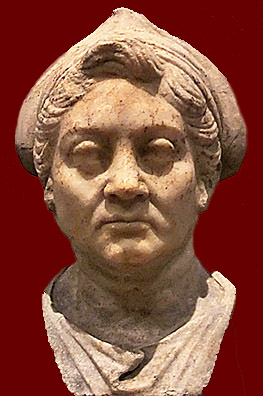
Older woman wearing cap
Roman, after mid-1st Century BCE

Urgulania (first century BCE-CE) is remembered almost solely in connection with her friendship with Livia, wife of Rome's first emperor Augustus and mother of Tiberius, Rome's second emperor, although she was an aristocrat in her own right. While her parentage and place of birth have not been recorded, her name indicates her descent from a noble Etruscan leader of the 4th century BCE, Orgolnium/Orgolnius Velthume of Caere (see Elogia Tarquiniensis). She married into the family of the Plautii, whose Etruscan roots are substantiated by an inscription to a Plautia in the fourth century BCE Tomb of the Reliefs in Caere and a recently discovered marble throne found on the site of the first century CE Roman villa of the Plautii Laterani (on the Caelian Hill). A plebeian family which first attained the consulship in 366 BCE, the Plautii in Rome had ties to the patrician family of the Claudii and other branches were prominent in central Italian cities (Tibur, where the ruined Tomb of the Plautii was sketched by Piranesi, Praeneste, and Caere). Urgulania was the grandmother of Plautius Silvanus, praetor urbanus in 24 CE, and Plautia Urgulanilla, the first wife of Rome's fourth emperor, Claudius (Suetonius, Claudius 26), whom he divorced on charges of adultery. Conscious of the status of her distinguished political family, Urgulania is described by Tacitus as assuming unprecedented privileges through her amicitia with Livia, placing herself "above the law” (Annales 2.34.2). In the passages below from Book II of the Annales, Tacitus offers two examples of such behavior from which she emerged surprisingly unscathed, the only woman outside of the imperial family to whom Tacitus attributes potentia. Summoned to court by the formidable L. Calpurnius Piso, Augur (consul 1 BCE), son of Cn. Calpurnius Piso (suffect consul 23 BCE) and brother of Cn. Piso, who committed suicide when charged with treason and the murder of Germanicus (Annales 2.34.2), Urgulania refused to appear, instead taking refuge in the imperial palace and allowing Livia to resolve the situation. Urgulania, summoned later to give testimony before the Senate, again refused to appear, requiring the praetor to interview her at home and prompting Tacitus to observe that from early times Vestal Virgins, known to be the most shielded of Roman women, appeared in court to give testimony. The excerpts from Book IV of the Annales show Urgulania in a different light: while she observes the downfall of her accusor Piso, as matriarch of her family she assumes a unique role in the punishment of her grandson for the murder of his second wife Apronia. Although Livia lives until 29 CE, there is no further mention of Urgulania in the literature. For more on the Plautii, see N. Terrenato, in Roman Republican Colonization (pp.48-54); on Tacitus's prose style, see Style of Tacitus and A. J. Woodman, Rhetoric in Classical Historiography: Four Studies, Chapter 4, "History and Alternative Histories: Tacitus."
II.34 (2)Haud minus liberi doloris documentum idem Piso mox dedit vocata in ius Urgulania, quam supra leges amicitia Augustae extulerat.
![]()
![]() Nec aut Urgulania obtemperavit, in domum Caesaris spreto Pisone vecta,
Nec aut Urgulania obtemperavit, in domum Caesaris spreto Pisone vecta,
![]() aut ille abscessit, quamquam Augusta se violari et imminui quereretur.
aut ille abscessit, quamquam Augusta se violari et imminui quereretur.
II.34 (3)Tiberius, hactenus indulgere matri civile ratus, ut se iturum ad praetoris
![]() tribunal, adfuturum Urgulaniae diceret, processit Palatio, procul sequi iussis militibus.
tribunal, adfuturum Urgulaniae diceret, processit Palatio, procul sequi iussis militibus.
Spectabatur occursante populo compositus ore et sermonibus variis tempus atque iter
![]() ducens, donec propinquis Pisonem frustra coercentibus deferri Augusta pecuniam quae petebatur iuberet.
ducens, donec propinquis Pisonem frustra coercentibus deferri Augusta pecuniam quae petebatur iuberet.
II.34 (4)Isque finis rei, ex qua neque Piso inglorius et Caesar maiore fama fuit.
Ceterum Urgulaniae potentia adeo nimia civitati erat, ut testis in causa quadam, quae apud senatum tractabatur, venire dedignaretur: missus est praetor, qui domi
![]() interrogaret, cum virgines Vestales in foro et iudicio audiri, quotiens testimonium dicerent, vetus mos fuerit.
interrogaret, cum virgines Vestales in foro et iudicio audiri, quotiens testimonium dicerent, vetus mos fuerit.
IV.21 (1) Actum dehinc de Calpurnio Pisone, nobili ac feroci viro.
Is namque, ut rettuli, cessurum se urbe ob factiones accusatorum in senatu clamitaverat
![]() et spreta potentia Augustae trahere in ius Urgulaniam domoque principis excire ausus erat.
et spreta potentia Augustae trahere in ius Urgulaniam domoque principis excire ausus erat.
Quae in praesens Tiberius civiliter habuit: sed in animo revolvente iras, etiam si impetus offensionis languerat, memoria valebat.
IV.22 (1)Per idem tempus Plautius Silvanus praetor incertis causis Aproniam coniugem in praeceps iecit,
![]() tractusque ad Caesarem ab L. Apronio socero turbata mente respondit, tamquam ipse somno gravis atque eo ignarus, et uxor sponte mortem sumpsisset.
tractusque ad Caesarem ab L. Apronio socero turbata mente respondit, tamquam ipse somno gravis atque eo ignarus, et uxor sponte mortem sumpsisset.
IV.22 (2) Non cunctanter Tiberius pergit in domum, visit cubiculum, in quo reluctantis et impulsae vestigia cernebantur.
![]() Refert ad senatum, datisque iudicibus Urgulania, Silvani avia, pugionem nepoti misit.
Refert ad senatum, datisque iudicibus Urgulania, Silvani avia, pugionem nepoti misit.
quod perinde creditum quasi principis monitu, ob amicitiam Augustae cum Urgulania.
Click on the underlined words for translation aids and commentary, which will appear in a small window. Click on the icon link![]() to the right of the line for related images and information.
to the right of the line for related images and information.